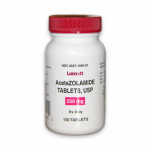- Type of Drug: Carbonic-anhydrase inhibitor.
- Prescribed for: Glaucoma and prevention or treatment of mountain sickness at high altitudes. This drug has also been used in treating epilepsy, including absence seizures, petit mal and grand mal epilepsy, tonic-clonic seizures, mixed seizures, and partial seizures.
General Information
Acetazolamide inhibits an enzyme in the body called carbonic anhydrase. This effect allows the drug to be used as a weak diuretic and as part of the treatment of glaucoma by helping to reduce pressure inside the eye. The same effect on carbonic anhydrase is thought to make Acetazolamide a useful drug in treating certain epileptic seizure disorders. The exact way in which the effect is produced is not understood.
Cautions and Warnings
Do not take Acetazolamide if you have serious kidney, liver, or Addison’s disease. This drug should not be used by people with low blood sodium or potassium.
Possible Side Effects
Side effects of short-term Acetazolamide therapy are usually minimal.
- Most common: nausea or vomiting; tingling feeling in the arms; legs, lips, mouth, or anus; loss of appetite and weight loss; a metallic taste; increased frequency in urination (to be expected, since this drug has a weak diuretic effect); diarrhea; feelings of ill health; occasional drowsiness or weakness.
Since this drug is chemically considered to be a sulfa drug, it can have sulfa side effects, including rash, drug crystals in the urine, painful urination, low back pain, urinary difficulty, and low urine volumes. - Rare: difficulty breathing, fever, sore throat, unusual bleeding or bruising, hives, itching, rash or sores, black or tarry stools, darkened urine, yellow skin or eyes, transient nearsightedness, clumsiness or unsteadiness, confusion, convulsions, ringing or buzzing in the ears, headache, sensitivity to bright light, increased blood sugar, weakness and trembling, nervousness, depression, dizziness, dry mouth, excessive thirst, abnormal heart rhythms, muscle cramps or pains, weak pulse, disorientation, muscle spasms, and loss of taste or smell.
Drug Interactions
- Avoid over-the-counter drug products that contain stimulants or anticholinergics, which tend to aggravate or cardiac disease. Ask your pharmacist about ingredients contained in over-the-counter drugs.
- Acetazolamide may increase blood concentrations of Cyclosporine, used to prevent the rejection of transplanted organs and for other purposes.
- Acetazolamide may inhibit or delay the absorption of Primidone (for seizures) into the bloodstream.
- Avoid Aspirin while taking Acetazolamide, since Acetazolamide side effects can be enhanced by this combination.
- The combination of Diflunisal and Acetazolamide can result in an unusual lowering of eye pressure.
Food Interactions
Acetazolamide may be taken with food if it causes stomach upset. Because Acetazolamide can increase potassium loss, take this drug with foods that are rich in potassium, like apricots, bananas, orange juice, or raisins.
Usual Dose
250 mg to 1 gram per day, according to disease and patient’s condition.
Overdosage
Symptoms of overdosage may include drowsiness, loss of appetite, nausea, vomiting, dizziness, tingling in the hands or feet, weakness, tremors, or ringing or buzzing in the ears. Overdose victims should be made to vomit as soon as possible with Syrup of Ipecac (available at any pharmacy), and taken to a hospital emergency room for further treatment. ALWAYS bring the medicine bottle.
Special Information
Acetazolamide may cause minor drowsiness and confusion, particularly during the first 2 weeks of therapy. Take care while performing tasks that require concentration, such as driving or operating appliances or machinery.
Call your doctor if you develop sore throat, fever, unusual bleeding or bruises, tingling in the hands or feet, rash, or unusual pains. These can be signs of drug side effects.
Acetazolamide can make you unusually sensitive to the sun. Avoid prolonged sun exposure and protect your eyes while taking this medicine.
If you forget a dose of Acetazolamide, take it as soon as you remember. If it is almost time for your next dose, skip the forgotten pill. Do not take a double dose.
Special Populations
Pregnancy/Breast-feeding
High doses of this drug may cause birth defects or interfere with your baby’s development. Check with your doctor before taking it if you are, or might be, pregnant.
Small amounts of Acetazolamide may pass into breast milk, but it has not caused problems in breast-fed infants.
Seniors
Older adults are more likely to have age-related problems that could lead to problems with Acetazolamide. Take this medication according to your doctor’s prescription.

